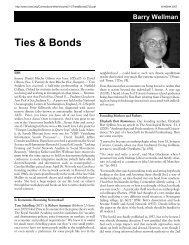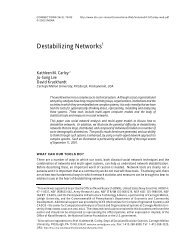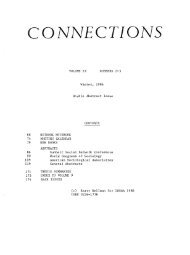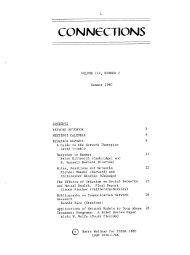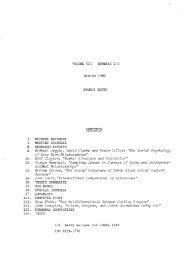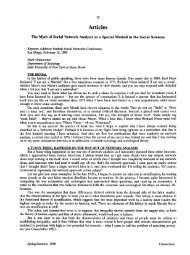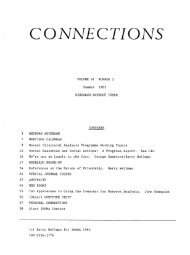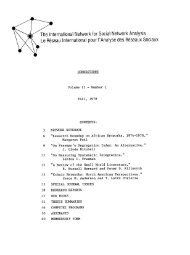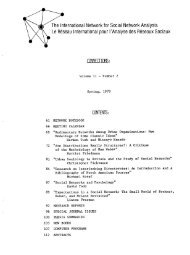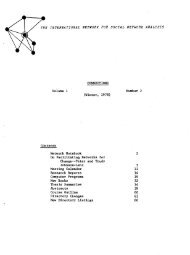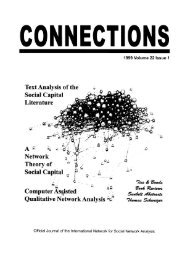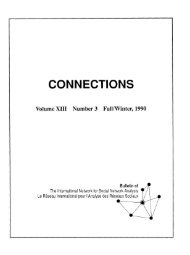Sunbelt XXXI International Network for Social Network ... - INSNA
Sunbelt XXXI International Network for Social Network ... - INSNA
Sunbelt XXXI International Network for Social Network ... - INSNA
You also want an ePaper? Increase the reach of your titles
YUMPU automatically turns print PDFs into web optimized ePapers that Google loves.
<strong>Social</strong> Constraints, Agency, And Institutions In The Formation Of Interorganizational Ties And Knowledge DiffusionGreenberg, Jason; Lazer, David; Binz‐Scharf, Maria C.; Mergel, Ines A.Education, knowledge and learning networksDiffusion, In<strong>for</strong>mation Sharing, Interorganizational <strong>Network</strong>s, In<strong>for</strong>mation SearchSUN.AM1Significant attention has been devoted to the patterns and consequences of boundary spanning activities, in<strong>for</strong>mation search and sharing, and isomorphism o<strong>for</strong>ganizational knowledge and practice. In much of this research organizations are viewed as social actors in and of themselves that engage in this boundaryspanning activity. This focus is sensible when analyzing the patterns of organizational ties. However, it is not especially well‐suited to the study of themechanisms governing how and why organizations span boundaries in the first place. In this research we open the black box of organizational boundaryspanning activity. Using unique qualitative and quantitative data from a knowledge intensive industry‐‐US government crime laboratories involved in DNAanalysis‐‐we identify several mechanisms leading to boundary spanning activity. Using the quantitative data we provide a test of several of the mechanisms, aswell as the antecedents of isomorphism processes. Results reveal that structural features, chance meetings, and the initiative of lab leaders (and to a lesserextent subordinates) lead to boundary spanning activity, access to distinct pools of knowledge, and, ultimately, isomorphism.<strong>Social</strong> Construction Of The Financial Market Of Exchange Traded Funds (etfs) In France: A <strong>Network</strong> Analysis Perspective.Oubenal, Mohamed<strong>Network</strong>s and EconomicsAdvice <strong>Network</strong>, Interorganizational <strong>Network</strong>s, Cooperation between competitors, Exchange Traded Funds(ETFs), intermediariesFRI.PM2Our paper aims at understanding the social construction of the market of Exchange Traded Funds (ETFs) in France. We assume that advice network allowscooperation needed <strong>for</strong> the inception of financial markets. We studied the advice relations between 57 actors of the French ETF market using Pajek andStocnet. Our network analysis evidences that managers and marketing officers use their relationships with other participants to produce a promotionalknowledge. We show that the advice network has a center‐periphery configuration with some banks having a central position. When moving frominterindividual to the interorganizational level we demonstrate the existence of a social niche between four banks. Building on structural approach we explainthat cooperation between competitors in this market is done through the intermediation of participants with special status. The extraction of relationsbetween some actors emphasizes that those intermediaries are event organizers namely: Edhec and Agefi. Those two actors are independent from banks andhave many relationships with investors.



